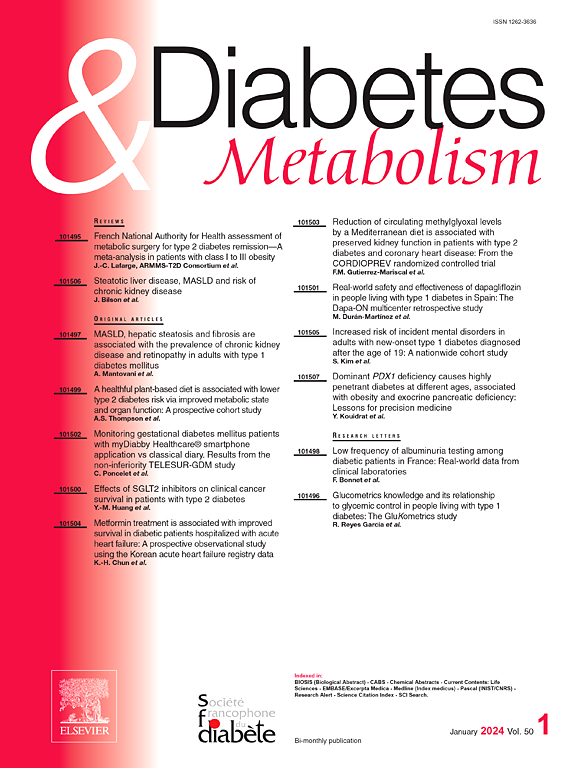SGLT-2i对2型糖尿病患者COPD加重的影响:一项系统综述和荟萃分析
IF 4.7
2区 医学
Q1 ENDOCRINOLOGY & METABOLISM
引用次数: 0
摘要
背景:慢性阻塞性肺疾病(COPD)和2型糖尿病(T2DM)经常共存,导致复合发病率、死亡率和医疗负担。慢性阻塞性肺病加重显著影响T2DM患者,频率和严重程度增加。钠-葡萄糖共转运蛋白-2抑制剂(SGLT-2i)在血糖控制和呼吸系统健康方面都有良好的疗效。本系统综述和荟萃分析旨在评估SGLT-2抑制剂对T2DM患者COPD加重的影响。方法:我们根据PRISMA指南进行了系统回顾和荟萃分析,评估了截至2025年3月发表的研究。通过PubMed、Embase和Web of Science的广泛搜索策略,确定了比较SGLT-2抑制剂与其他降糖药的相关研究。符合预定义资格标准的研究,包括那些提供COPD加重频率和住院率定量数据的研究,被纳入分析。结果共纳入8项研究,共纳入4,64,542名受试者。SGLT-2抑制剂对COPD加重影响的合并风险比(HR)为0.646 (95% CI: 0.470-0.889),表明与其他抗糖尿病药物相比,加重减少35%。SGLT-2抑制剂的疗效优于DPP-4抑制剂(HR: 0.618, 95% CI: 0.462-0.827)和磺脲类药物(HR: 0.620, 95% CI: 0.526-0.731)。然而,严重恶化的减少没有统计学意义(HR: 0.715, 95% CI: 0.403-1.269)。亚组分析显示,SGLT-2抑制剂与GLP-1受体激动剂相比具有适度但显著的优势(HR: 0.940, 95% CI: 0.890-0.993)。结论:ssglt -2抑制剂可显著降低T2DM患者COPD加重,在血糖控制和呼吸健康管理方面具有双重益处。这些发现支持将SGLT-2抑制剂整合到T2DM-COPD重叠治疗方案中。需要进一步的随机对照试验和长期研究来证实其持久疗效并探索其潜在机制。本文章由计算机程序翻译,如有差异,请以英文原文为准。
Impact of SGLT-2i on COPD exacerbations in patients with type 2 diabetes mellitus: A systematic review and meta-analysis
Background
Chronic Obstructive Pulmonary Disease (COPD) and Type 2 Diabetes Mellitus (T2DM) often coexist, leading to compounded morbidity, mortality, and healthcare burden. COPD exacerbations significantly impact patients with T2DM, with increased frequency and severity. Sodium-glucose cotransporter-2 inhibitors (SGLT-2i) have demonstrated promising benefits in managing both glycemic control and respiratory health. This systematic review and meta-analysis aim to assess the impact of SGLT-2 inhibitors on COPD exacerbations in T2DM patients.
Methods
We conducted a systematic review and meta-analysis following PRISMA guidelines, evaluating studies published until March 2025. A broad search strategy across PubMed, Embase, and Web of Science identified relevant studies comparing SGLT-2 inhibitors with other antidiabetic agents. Studies meeting predefined eligibility criteria, including those providing quantitative data on COPD exacerbation frequency and hospitalization rates, were included in the analysis.
Results
Eight studies involving 4,64,542 participants were included. The pooled hazard ratio (HR) for the impact of SGLT-2 inhibitors on COPD exacerbations was 0.646 (95 % CI: 0.470–0.889), demonstrating a 35 % decrease in exacerbations compared to other antidiabetic agents. SGLT-2 inhibitors demonstrated superior efficacy over DPP-4 inhibitors (HR: 0.618, 95 % CI: 0.462–0.827) and sulfonylureas (HR: 0.620, 95 % CI: 0.526–0.731). However, the reduction in severe exacerbations was not statistically significant (HR: 0.715, 95 % CI: 0.403–1.269). Subgroup analysis indicated that SGLT-2 inhibitors had a modest but significant advantage over GLP-1 receptor agonists (HR: 0.940, 95 % CI: 0.890–0.993).
Conclusions
SGLT-2 inhibitors significantly reduce COPD exacerbations in T2DM patients, offering dual benefits in managing both glycemic control and respiratory health. These findings support the integration of SGLT-2 inhibitors into treatment regimens for T2DM-COPD overlap. Further randomized controlled trials and long-term studies are needed to confirm the lasting efficacy and explore the underlying mechanisms.
求助全文
通过发布文献求助,成功后即可免费获取论文全文。
去求助
来源期刊

Diabetes & metabolism
医学-内分泌学与代谢
CiteScore
12.00
自引率
4.20%
发文量
86
审稿时长
13 days
期刊介绍:
A high quality scientific journal with an international readership
Official publication of the SFD, Diabetes & Metabolism, publishes high-quality papers by leading teams, forming a close link between hospital and research units. Diabetes & Metabolism is published in English language and is indexed in all major databases with its impact factor constantly progressing.
Diabetes & Metabolism contains original articles, short reports and comprehensive reviews.
 求助内容:
求助内容: 应助结果提醒方式:
应助结果提醒方式:


